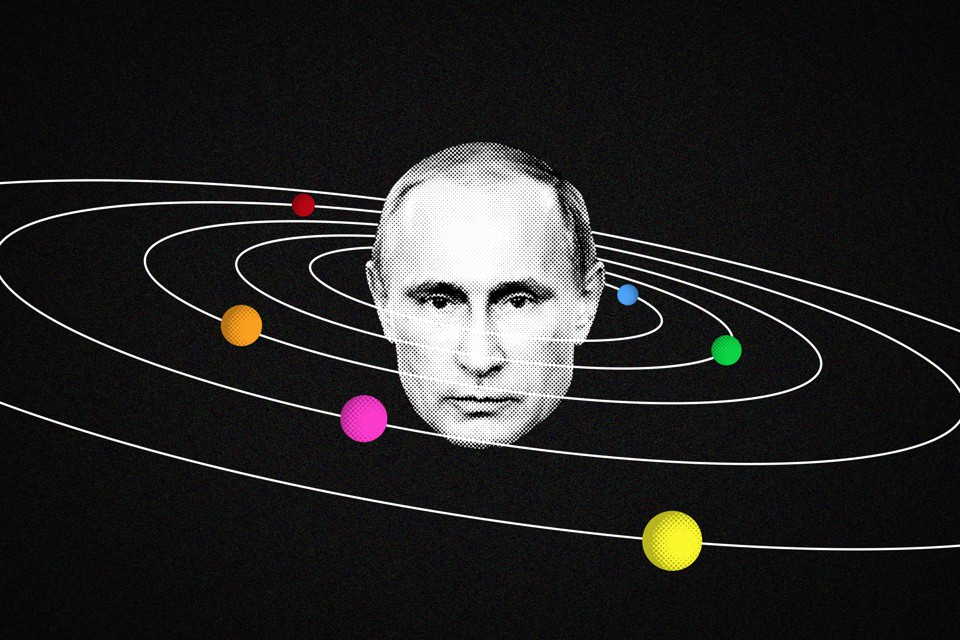JahFocus CS
Get It How You Get It
It’s Putin’s World
How the Russian president became the ideological hero of nationalists everywhere

Edmon De Haro; Alexei Nikolsky / Getty
In 2012, vladimir putin returned to the presidency after a four-year, constitutionally imposed hiatus. It wasn’t the smoothest of transitions. To his surprise, in the run-up to his inauguration, protesters filled the streets of Moscow and other major cities to denounce his comeback. Such opposition required dousing. But an opportunity abroad also beckoned—and the solution to Putin’s domestic crisis and the fulfillment of his international ambitions would roll into one.
After the global financial crisis of 2008, populist uprisings had sprouted across Europe. Putin and his strategists sensed the beginnings of a larger uprising that could upend the Continent and make life uncomfortable for his geostrategic competitors. A 2013 paper from the Center for Strategic Communications, a pro-Kremlin think tank, observed that large patches of the West despised feminism and the gay-rights movement and, more generally, the progressive direction in which elites had pushed their societies. With the traditionalist masses ripe for revolt, the Russian president had an opportunity. He could become, as the paper’s title blared, “The New World Leader of Conservatism.”
Putin had never spoken glowingly of the West, but grim pronouncements about its fate grew central to his rhetoric. He hurled splenetic attacks against the culturally decadent, spiritually desiccated “Euro-Atlantic.” He warned against the fetishization of tolerance and diversity. He described the West as “infertile and genderless,” while Russian propaganda derided Europe as “Gayropa.” At the heart of Putin’s case was an accusation of moral relativism. “We can see how many of the Euro-Atlantic countries are actually rejecting their roots, including the Christian values that constitute the basis of Western civilization,” he said at a conference in 2013. “They are denying moral principles and all traditional identities: national, cultural, religious, and even sexual … They are implementing policies that equate large families with same-sex partnerships, belief in God with the belief in Satan.” By succumbing to secularism, he noted on another occasion, the West was trending toward “chaotic darkness” and a “return to a primitive state.”
Few analysts grasped the potency such rhetoric would have beyond Russia. But right-wing leaders around the world—from Rodrigo Duterte in the Philippines to Nigel Farage in Britain to Donald Trump in the U.S.—now speak of Putin in heroic terms. Their fawning is often discounted, ascribed to under-the-table payments or other stealthy Russian efforts. These explanations don’t wholly account for Putin’s outsize stature, however. He has achieved this prominence because he anticipated the global populist revolt and helped give it ideological shape. With his apocalyptic critique of the West—which also plays on anxieties about Christendom’s supposedly limp response to Islamist terrorism—Putin has become a mascot of traditionalist resistance.
AT FIRST, most Western observers assumed that Putin wouldn’t win fans outside the furthest fringes of the right. In France, Russia’s hopes initially focused on Marine Le Pen, the fierce critic of immigration and globalization, whose National Front party has harbored Holocaust deniers and Vichy nostalgists. In 2014, a Russian bank loaned Le Pen’s cash-strapped party 9 million euros. Le Pen, in turn, has amplified Putin’s talking points, declaring Russia “a natural ally of Europe.”
If Europe’s far-right parties were Putin’s landing beach, he has made inroads, and hovers over the current French presidential election. During last year’s campaign for the nomination of France’s Republican Party—the newly rechristened home of the center-right—candidates tripped over themselves to pay obeisance. Former President Nicolas Sarkozy, vying to resurrect his career, sprinted away from his own history of slagging the Russian strongman. On a trip to St. Petersburg in June, he made a point of stopping for a photo op with Putin, pumping his hand and smiling broadly. Sarkozy’s pre-campaign book swooned, “I am not one of his intimates but I confess to appreciating his frankness, his calm, his authority. And then he is so Russian!” These were gaudy gestures, but hardly idiosyncratic. Sarkozy’s rival François Fillon behaved just as effusively, though his affection seemed less contrived—during his years as prime minister, from 2008 to 2012, he cultivated a tight relationship with the man he has called “my dear Vladimir.” In November, Alain Juppé, the Republican contender initially favored by oddsmakers, moaned, “This must be the first presidential election in which the Russian president chooses his candidate.” But deriding his opponents for “acute Russophilia” hardly helped him: Fillon is now the party’s nominee, having drubbed Juppé by more than 30 points.
The French embrace of Putin has roots in the country’s long history of Russophilia and anti-Americanism. But Putin’s vogue also stems from the substance of his jeremiads, which match the mood of France’s conservative base. As French book sales reveal, the public has an apparently bottomless appetite for polemics that depict the country plummeting to its doom. Much anxiety focuses on the notion of le grand remplacement, the fear that France will turn into a Muslim country, aided by native-born couples’ failure to reproduce. The gloom is xenophobic, but also self-loathing. Right-wing polemicists bellow that France will squander its revolutionary tradition and cultural heritage without lifting a finger to save itself. The defining screed is Éric Zemmour’s The French Suicide, an unabridged catalog of the forces sucking the vitality from his country—post-structuralist academics, unpatriotic businessmen, technocrats in the European Union.
Continued at The Atlantic